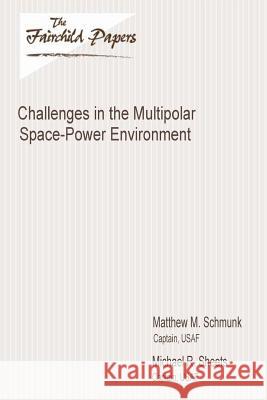Challenges in the Multipolar Space-Power Environment: Fairchild Paper » książka
Challenges in the Multipolar Space-Power Environment: Fairchild Paper
ISBN-13: 9781479364633 / Angielski / Miękka / 2012 / 76 str.
Space power is arguably one of the most valuable, yet underappreciated and misunderstood components of US national power. The effects derived from our presence in space have tremendous strategic implications: an explosion of communication capabilities, better weather prediction, precision navigation, and intelligence are but a few of the dividends derived from investments in space programs. The United States no longer enjoys a near monopoly on space effects. Every week brings news of advances in space technologies by China, Russia, India, European powers, and others. Space, as a strategic medium (and probably a future warfighting medium), is the ultimate high ground; it is now widely shared and could be hotly contested. Ranging from satellite based access to Internet services to China's recent shoot down of one of its own satellites, new capabilities derived from space based assets are accelerating in terms of quality, ingenuity, and importantly, availability to allies and enemies alike. US leaders must understand the strategic implications of these advances. The authors have filled an important void in the literature on the role of space in strategic decision making by applying two models. The first is Col W. Michael Guillot's paper on strategic leadership, which serves as an excellent framework to analyze the space programs-and their significance-of three of the United States' peer competitors in space: China, India, and the European Union. By putting individual advances of these entities in their proper strategic context, the reader gains a broader and deeper understanding of the meaning of these advances. Additionally, the authors apply the familiar "VUCA" (volatility, uncertainty, complexity, and ambiguity) model to space programs, aiding the reader in developing a framework in which to analyze space-power advances. The inevitable conclusion upon reading this paper is that senior decision makers must plan for a strategic landscape where the United States does not enjoy unmatched or uncontested benefits from space power. Additionally, the authors make specific policy prescriptions regarding further development of US space power, international cooperation regarding space programs and effects, and suggestions on de-escalation mechanisms for developing space-based conflicts. Modern Airmen must be familiar with the entire vertical dimension, and this paper serves as an excellent primer for that purpose.
Zawartość książki może nie spełniać oczekiwań – reklamacje nie obejmują treści, która mogła nie być redakcyjnie ani merytorycznie opracowana.











